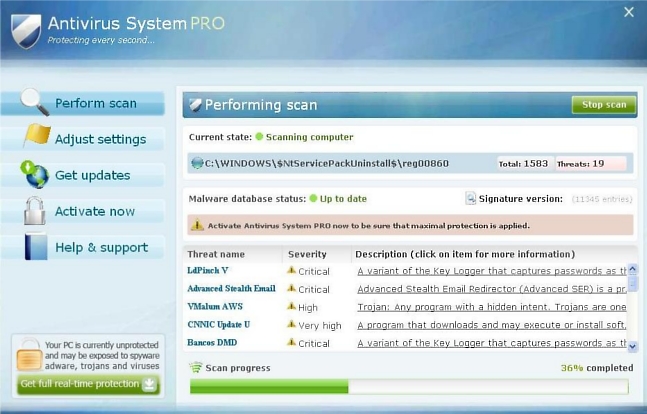Rogue:W32/SysGuard.D
Summary
Dishonest antivirus software which tricks users into buying or installing it, usually by infecting a user's computer, or by pretending the computer is infected.
Removal
Based on the settings of your F-Secure security product, it will either move the file to the quarantine where it cannot spread or cause harm, or remove it.
A False Positive is when a file is incorrectly detected as harmful, usually because its code or behavior resembles known harmful programs. A False Positive will usually be fixed in a subsequent database update without any action needed on your part. If you wish, you may also:
-
Check for the latest database updates
First check if your F-Secure security program is using the latest updates, then try scanning the file again.
-
Submit a sample
After checking, if you still believe the file is incorrectly detected, you can submit a sample of it for re-analysis.
Note: If the file was moved to quarantine, you need to collect the file from quarantine before you can submit it.
-
Exclude a file from further scanning
If you are certain that the file is safe and want to continue using it, you can exclude it from further scanning by the F-Secure security product.
Note: You need administrative rights to change the settings.
Technical Details
Rogue:W32/Sysguard is distributed by Trojan-Downloader:W32/FraudLoad.HK. While active, the rogue also occasionally displays popup advertisements and attempts to connect to a few remote sites.
Execution
During execution, the following files are added:
- %temp%\571.exe
- %localappdata%\[random folder name]\[4 random characters]sysguard.exe
- %windir%\system32\iehelper.dll
While the following hosts files are modified, with the following contents:
- 91.212.127.227 aviraplatinum2009.microsoft.com
- 91.212.127.227 aviraplatinum2009.com
- 91.212.127.227 www.aviraplatinum2009.com
OR
- 91.212.127.227 antiviraprof2009.microsoft.com
- 91.212.127.227 antiviraprof2009.com
- 91.212.127.227 www.antiviraprof2009.com
Activity
Upon execution, SysGuard will start the scanning process, which looks like the following screenshot:

To pressure the user further, SysGuard prevents some programs from launching, then displays the following message alleging that the program is infected and asking the user to 'start your antivirus software':

While active, the rogue attempts to connect the following URLs:
- https://91.212.[...].227/check
- https://193.[...].12.51/check
- https://aviraplatinum2009.com/[...].php?[...].1
From time to time, it will display popup ads to the following websites:
- www.porno. com
- www.adult. com
- www.viagra. com
Registry Changes
The rogue makes the following changes to the Registry
- [HKCR\CLSID\{B6D223F6-C185-49a2-BA7E-A03E84744702}] @="BHO"
- [HKCR\CLSID\{B6D223F6-C185-49a2-BA7E-A03E84744702}\InProcServer32] @= C:\WINDOWS\system32\iehelper.dll" ThreadingModel="Apartment"
- [HKLM\Software\Classes\CLSID\{B6D223F6-C185-49a2-BA7E-A03E84744702}] @="BHO"
- [HKLM\Software\Classes\CLSID\{B6D223F6-C185-49a2-BA7E-A03E84744702}\InProcServer32] @="C:\WINDOWS\system32\iehelper.dll" ThreadingModel="Apartment"
- [HKLM\Software\Software\Microsoft\Windows\CurrentVersion\run] {random_value}="%localappdata%\[random folder name]\[4 random characters]sysguard.exe"
- [HKCU\Software\AvScan]
- [HKCU\Software\Microsoft\Windows\CurrentVersion\run] {random_value}="%localappdata%\[random folder name]\[4 random characters]sysguard.exe"
)
Protect your devices from malware with F‑Secure Total
Protecting your devices from malicious software is essential for maintaining online security. F‑Secure Total makes this easy, helping you to secure your devices in a brilliantly simple way.
- Award-winning antivirus and malware protection
- Online browsing, banking, and shopping protection
- 24/7 online identity and data breach monitoring
- Unlimited VPN service to safeguard your privacy
- Password manager with private data protection
More Support
Community
Ask questions in our Community .
User Guides
Check the user guide for instructions.
Submit a Sample
Submit a file or URL for analysis.